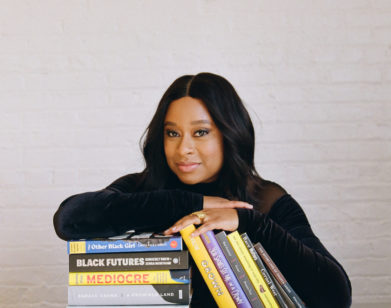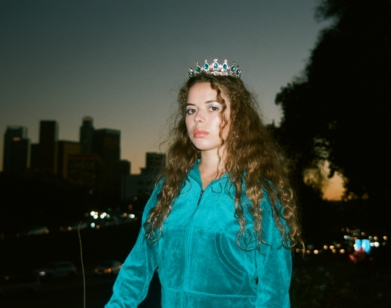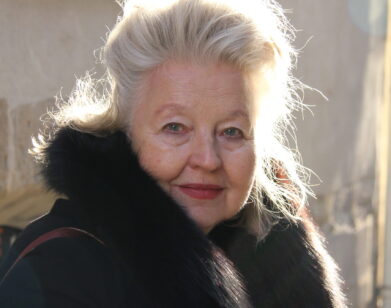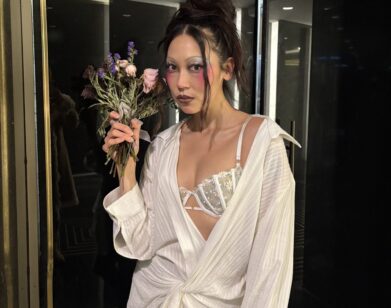TOUR DIARY
“You’re Creating a Pocket of Love”: On the Road With Nilüfer Yanya and Lutalo Jones

Photos courtesy of Nilüfer Yanya and Lutalo.
On her third studio album, British singer-songwriter Nilüfer Yanya delivers her most cohesive and ethereal outpouring of emotion yet. The album’s title, My Method Actor, almost functions as a metaphor for the honing of her own musical persona, which appears here at its most deliberate, focused, and performative. Yanya’s 2022 album, Painless, was partially produced with her frequent collaborator Wilma Archer. But this time, Yanya made the conscious decision to work exclusively with Archer, turning the dial on the sounds they experimented with the first time around. “That worked,” Yanya told Lutalo Jones, the indie rocker who’s supporting on the U.S. leg of her fall tour. “So how can we do it again, but better?” After sound-checking for their final tour stop in San Francisco, the two musicians got to talking about the pressures of platforming your music, living out of a hotel room, and touring while the world is in crisis.
———
NILÜFER YANYA: Thanks for doing this with me, by the way.
LUTALO JONES: Of course. Thanks for having me. This will be really fun. Are you guys already at the venue right now?
YANYA: We just go to the venue, yeah. And you’re at Peggy’s dad’s house?
JONES: That’s right. It’s actually really sick. I didn’t really know what to expect, but it’s tucked in the woods up this mountain. We drove eight hours up here, and they had a dinner set for us when we arrived. It was the most sweet and wholesome way to roll up.
YANYA: That’s so nice. Like a warm welcome, like a homecoming.
JONES: Yeah, exactly. Well, I guess we’re talking about tour life. It’s funny, because you and I have had very different experiences, probably. You’re doing mostly hotel crashing, and we’ve been crashing mostly with friends and family. How’s that treating you? Have you ever done a DIY kind of tour where you were crashing on friends’ couches?
YANYA: I don’t know many people in the US or even the UK. Maybe once or twice I stay at someone’s house, which has been a really nice experience, but mostly it’s been Airbnb’s or hotels.
JONES: Do you like that aspect of touring? Do you like the hotel stuff?
YANYA: They’re not really fancy hotels. It’s nice to have a nice place to sleep, a comfy bed, definitely.
JONES: Yeah.
YANYA: But you guys are all managing yourselves as well?
JONES: Pretty much. It gets a little complicated. I’m not the best at logistics. My brain just gets so muddled sometimes. I’ve noticed when I’m in charge of having to make sure things are all together, it takes a lot out of me.
YANYA: Have you ever had a tour manager?
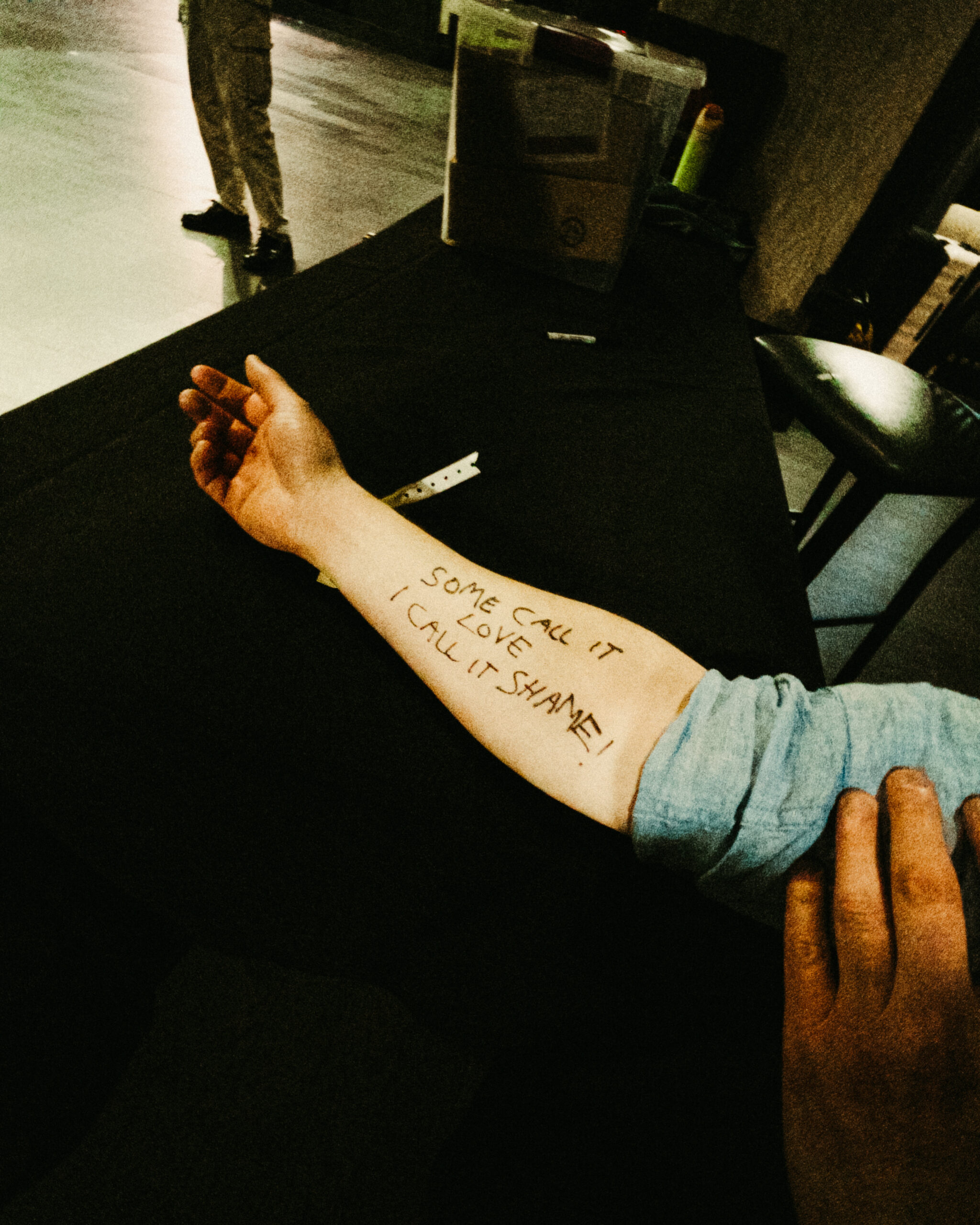
Photo by Adrienne Lowry.
JONES: I’ve actually never had a tour manager. Most of the tours I’ve done have been with my friends that were in the band and they’re just kind of handling it all and I’m just rolling with them. Or my partner comes with me. She’s a lot more organized, so she helps carry some of that weight, honestly.
YANYA: Yeah. So I was listening to the album…
JONES: Oh, yeah?
YANYA: I love it so much. When I was listening, there were five where I was like, “I love all these songs.” I realized it’s because we play them during the set. I was just curious, did you intentionally want to have a strip that altogether has a kind of funky sound for the shows, or was it just how it happened? And how did you choose your musicians for the band?
JONES: Well, the idea was to try to make a three-piece work really well. One, because that’s just the cost that I can afford right now, but then also, I wanted all these songs to be able to be played with a three-piece at the very least. If the songs can’t be translated on a guitar, then sometimes I just don’t feel like it. So with this setup, it really allows for the low end to be covered, obviously by bass, and a lot of the melody covered by me and guitar, and then the energy and power that comes from the drums has to be really important. I needed someone on the drums that is both technically skilled but also has the energy and drive as a rock drummer—
YANYA: Which we got.
JONES: Which we get with Micah Rubin on the drums. He is killing that. My other friend, Zach James, is also really good at that as well.
YANYA: Did he play on record?
JONES: No, I played everything on the record.
YANYA: That’s sick. Okay. Were drums your first instrument?
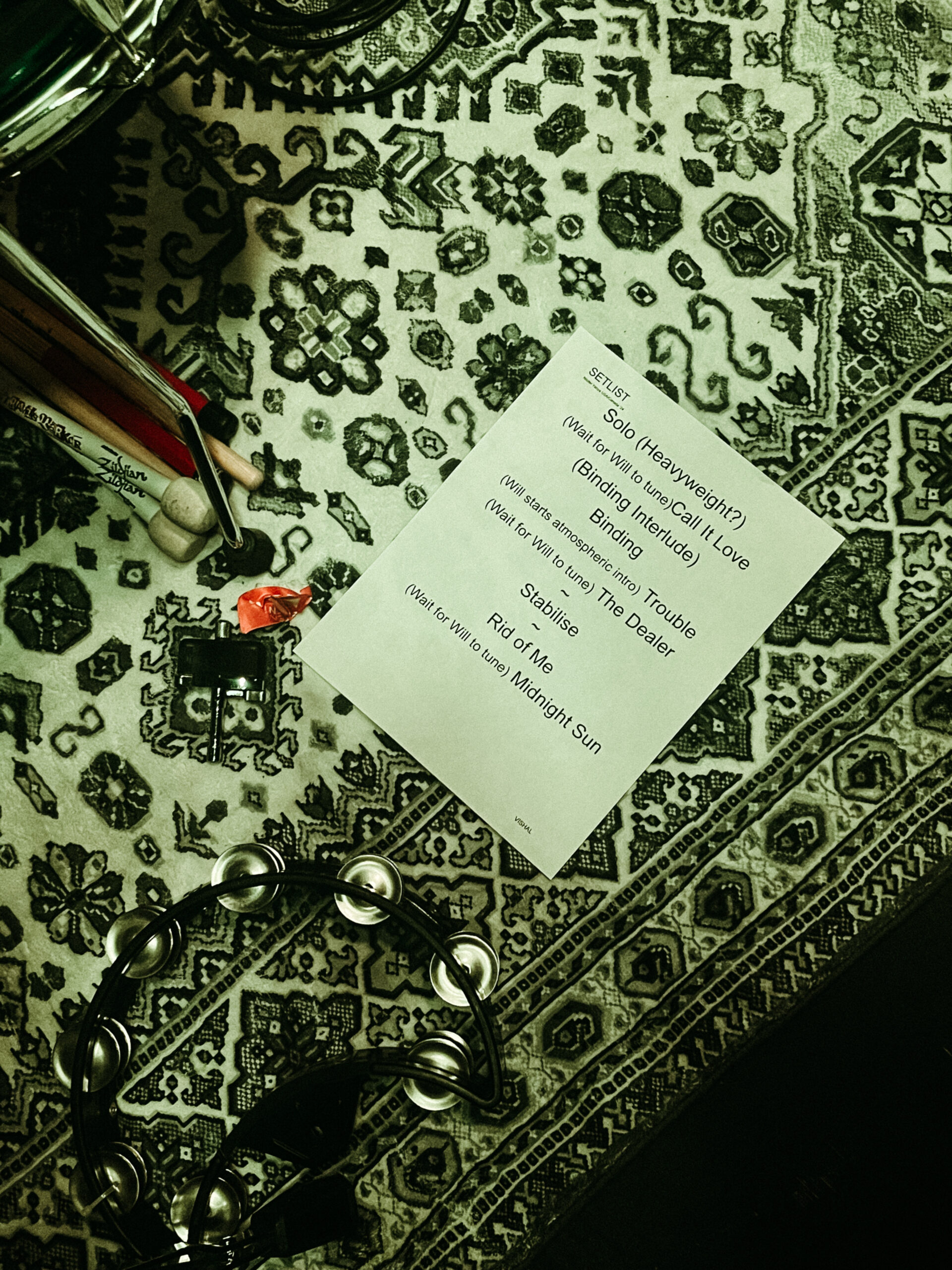
Photo by Adrienne Lowry.
JONES: Yeah. Drums were my first instrument, and then I just applied everything else I could.
YANYA: That’s so cool.
JONES: Then we got Lily Seabird playing bass, and she has such an important stage presence that I felt was really needed. What about you? You’ve got a lot of intricate production parts.
YANYA: It’s gotten way out of control. But I was just going to say, the first time me and Owen were on the side of the stage watching your show in Philadelphia he was like, “Oh my god, that’s a proper rock band.” It was crazy to me that you guys hadn’t been playing together forever, because I always tend to play with the same people, so I just assume everyone else does the same thing.
JONES: You know what? I keep trying to fight for it. It’s really hard where I live to have consistency. But it is really cool to see that you have people that you’ve known for so long that are rocking with you. You guys are super familiar with each other. The vibe on tour feels very sibling-esque. You guys are hanging and fucking around.
YANYA: Yeah, it’s true.
JONES: We were just bumping your record last night too, because Lily was wanting to show her dad and we were cranking it over his speaker system while we were having dinner. It’s really amazing. We listened to your 2022 album and then the most recent album Method Actor as well. How’s the transition been for you between those two, and what kind of direction were you inspired to go into for this record?
YANYA: I guess the only way I can describe it is, it really felt like Wilma [Archer]. We basically worked on Painless almost as much as My Method Actor, not to the same extent, but it was the first time we properly worked on a bigger body of songs together, so it really felt like it was kind of like our album. But this album was the one that we said from the start, “Let’s just work on it, us two, nobody else.”
JONES: Sick.
YANYA: I feel like a lot of the sounds we were trying on Painless we were able to push further to be like, “Okay, well that worked, so how can we do it again, but better?”
JONES: Totally. How long was your process for creating your record? Was this a scatter over time or did you consolidate it and record and write?
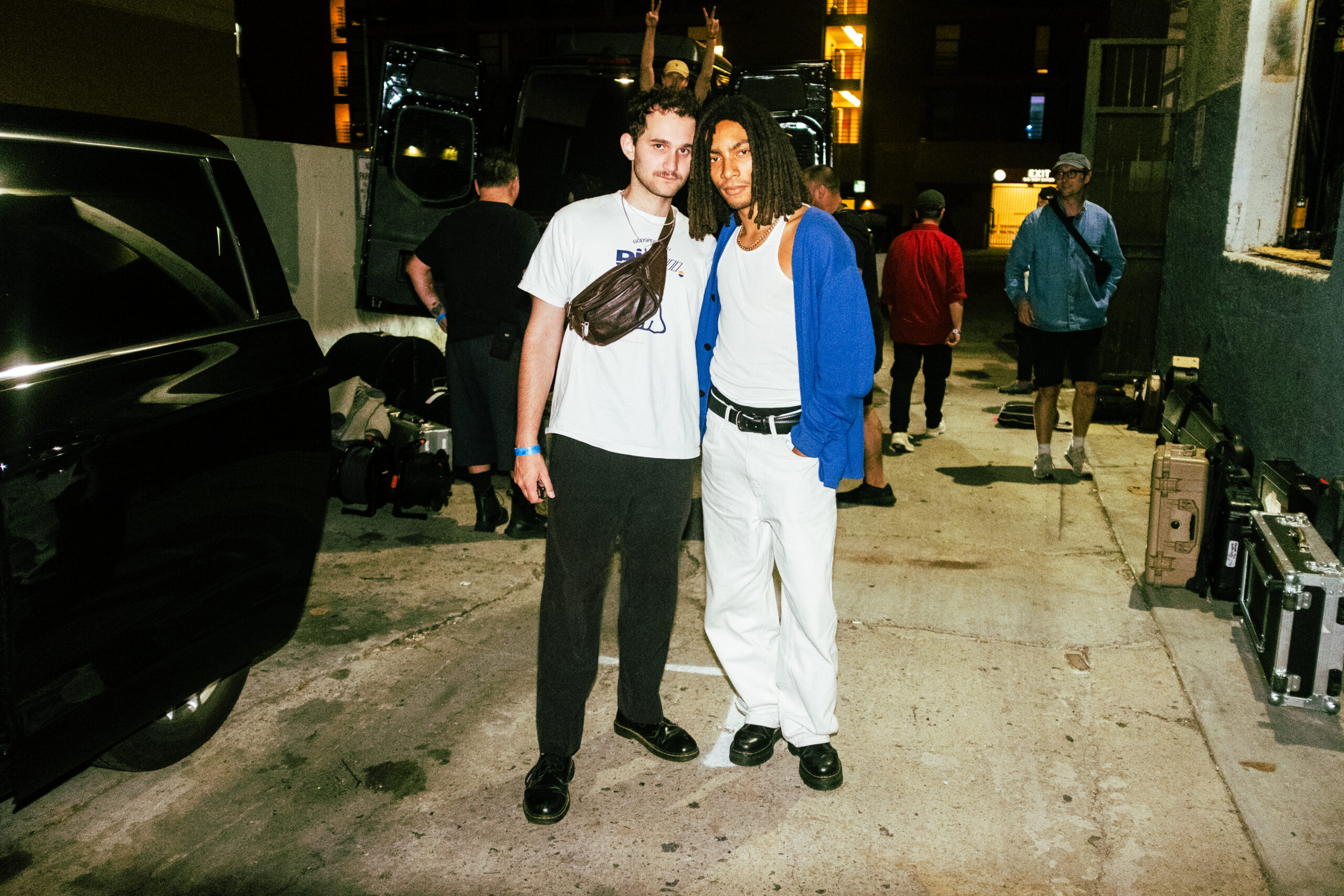
Photo by Sophia Ragomo.
YANYA: It was a year overall. I’d say we spent about eight months just focused on writing, and then the rest was doing final vocal takes and drum takes. Obviously Wilma’s producing as we go along, so there’s always that involved, but they were a lot more bare bones for a while. There was a lot less production going on. There were hints, but we spent quite a bit of time on the production after we concluded the writing, and it made such a massive difference.
JONES: Yeah, that makes total sense. Were you working on the record and touring simultaneously?
YANYA: No, this is the special thing about this album, I wasn’t touring. I did four shows that year.
JONES: Nice.
YANYA: I was also in between record deals, so it was a nice window of time to be like, “I’m going to start working on an album.” So yeah, I said I’m not going to tour because I felt like it just makes it very confusing.
JONES: Yeah, extremely.
YANYA: I’ve done it in the past. For my first album, I was just trying to write and I was doing all these random shows and going on tours and writing, and it was so difficult to stay focused and not be continually exhausted. It felt like a bit of a statement to be like, “No, I’m not going to play any shows. I’m just going to write the album, because that’s my job.”
JONES: Yeah. I find myself getting more short and irritable while on tour and trying to work. Because I was on tour while we were mixing the record, I’m listening in the car and trying to hear what the mix is, but there’s no way I can actually properly sit down with it. I’m curious to know how you find your balance between touring and all the other stuff at the same time?
YANYA: It’s really complicated and difficult, but I feel like it’s all to do with how I’m thinking about it. I’ve always understood: you work on a record, you tour the record, then maybe you have a little break and then you go back to doing it again. I always knew that was the case, but I feel like now I finally understand what it actually takes from you, from starting it until you see it through to the end. I feel like I’m really starting to understand that in a physical sense, and I’m trying to section it up in my mind a bit so I can give myself a little bit more breathing room.
JONES: Instead of letting it just take over?
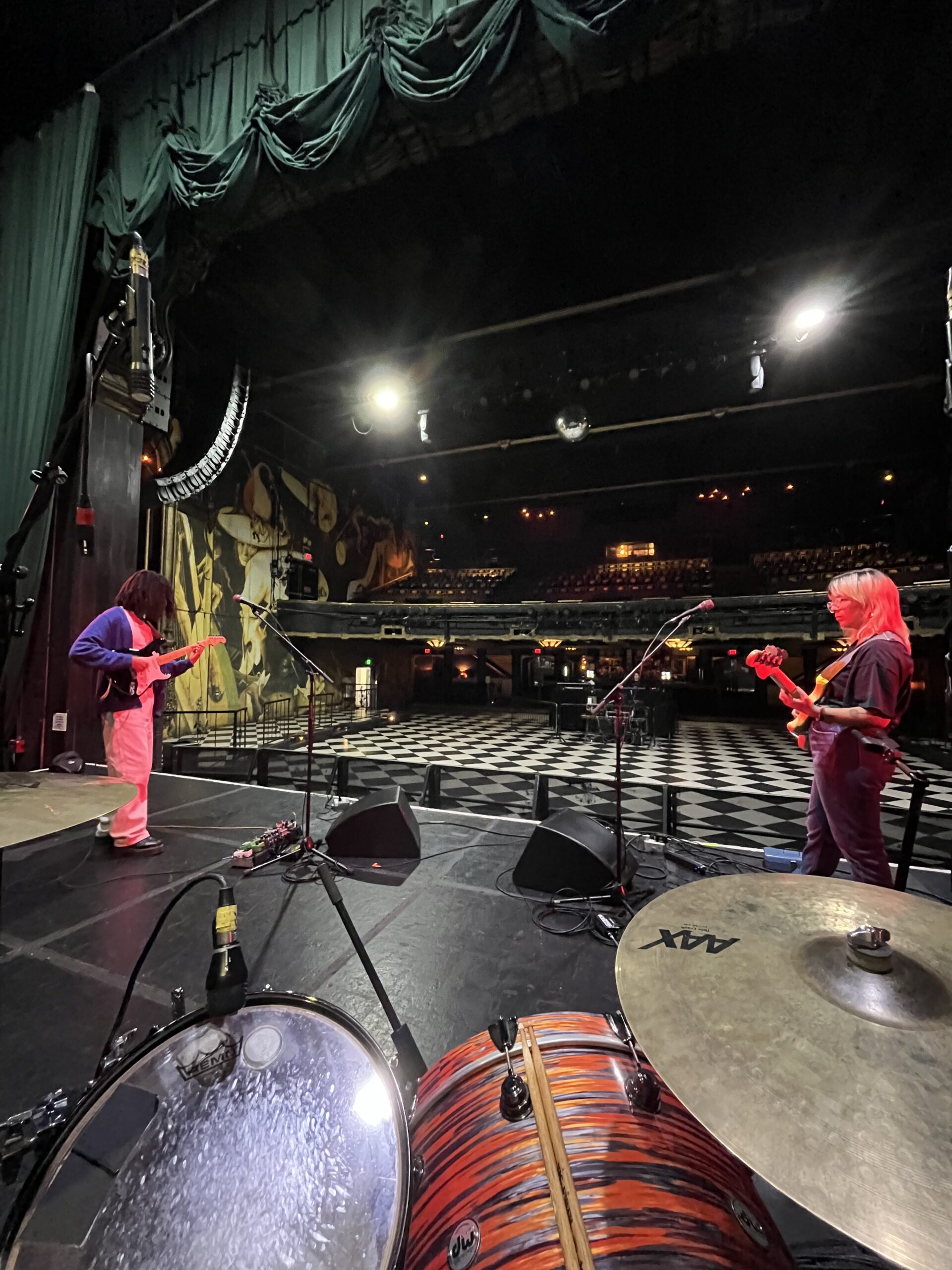
Photo courtesy of Lutalo Jones and the band.
YANYA: Yeah. Like, “Oh my God, I’m making an album.” Everything has to be about the album again. And then, “Oh my Ggd, I’m going on tour.” Everything has to be about the tour. I realized most of my time doing this, which is most of my twenties, I’ve only been there to see one thing at a time. Almost like tunnel vision, you can only focus on that one show or the one week where you’re going to be writing somewhere. It’s almost impossible to think past it in a way. You know what you’re going to do afterwards, but you still can’t really focus on it. I have not been able to plan anything beyond what I’m going to be doing in a month. It takes up a lot of energy and mental space, so I’m trying to work on clearing up little spaces in my mind so I can be calm and focus on other things that I might want to do. You know what I mean?
JONES: I do know what you mean. That’s why I asked the question, because this is something that I’m trying to figure out for myself. I’m trying to find more balance. Touring takes so much presence and so much attention and a lot of physical and mental regulation. You’re trying to try to catch up while also just trying to survive in the moment.
YANYA: Yeah, that is what it’s like. You like touring though?
JONES: Yeah, there’s aspects of touring that I really do enjoy. I love connecting with my band. I love connecting with people on the stage. I do really enjoy the quickness of just playing shows. If there’s low pressure around it, then that’s the best feeling, because then I’m just there to play my music and focus on putting on a really good show. I’m very passionate about that and conveying the music or the larger message, having something that I actually get to speak out into the world other than just being on social media. But do I have my criticisms of how touring works? A hundred percent.
YANYA: Oh, boy. Do we.
JONES: Yeah, exactly. That’s what I guess I’m navigating at the moment is like, “How much do I want or need to be doing this?” And also, how is the touring industry changing right now? I try to stay well-read, but there’s a lot happening right now.
YANYA: Yeah. Is it even going to exist in 20 years? We don’t really know because of the way everything’s changing so fast and climate change and—
JONES: Yeah, it’s all of that. There’s so many aspects. Sometimes I’m questioning, “Is this really the best use of my time or is this the realest thing in the room right now?” Music is incredibly important, but at the same time there’s a lot of real things going on right now. To be like, “Hey, come out to my fucking tour,” feels insane.

Photo courtesy of Lutalo Jones and the band.
YANYA: Yeah. I’ve been finding it very disconcerting and upsetting being on the road promoting the shows, and then also just knowing what is going on in Palestine or Lebanon and just feeling so… ugh.
JONES: It’s a really hard one. The context feels insane, and I struggle with it quite a bit. Also, it’s complicated because I also do think that fun and happiness and joy is an act of resistance in itself to despair. So you being up on stage, you’re creating a pocket of love and warmth and happiness, which I see in your fans. I see how much they care and how much it means to them, so I think you’re actually doing very important work on both sides of those things.
YANYA: Yeah, it’s like you just never know what else has been going on in people’s days as well. Maybe they’ve had a terrible day or they’ve also been feeling the same thing, so they’re being at protests and then they want to go see your show because they like music, and then they’ll have a nice moment of connecting and kind of restoring. And as much as I don’t even think of myself as an extrovert, there is something to be said for feeling like everyone’s in something together and for bringing people together. It gets me thinking, “Okay, if you can do this, what else can you do?”
JONES: Organize. Yeah.
YANYA: Have you read this book by Octavia Butler, Parable of the Talents?
JONES: I’ve heard about it. Maybe you were telling me about this?
YANYA: Yeah, I was telling you about it. It’s about societal collapse in America, and she kind of rebuilds community and a new way of life, even though literally the world’s gone to absolute madness. And they’ve elected some new horrible president who’s going to “Make America Great Again” and all this weird religious, cultish stuff. But she builds up a community of people and everyone learns to make things again and build things with their hands and they become useful. I think you’ll like it.
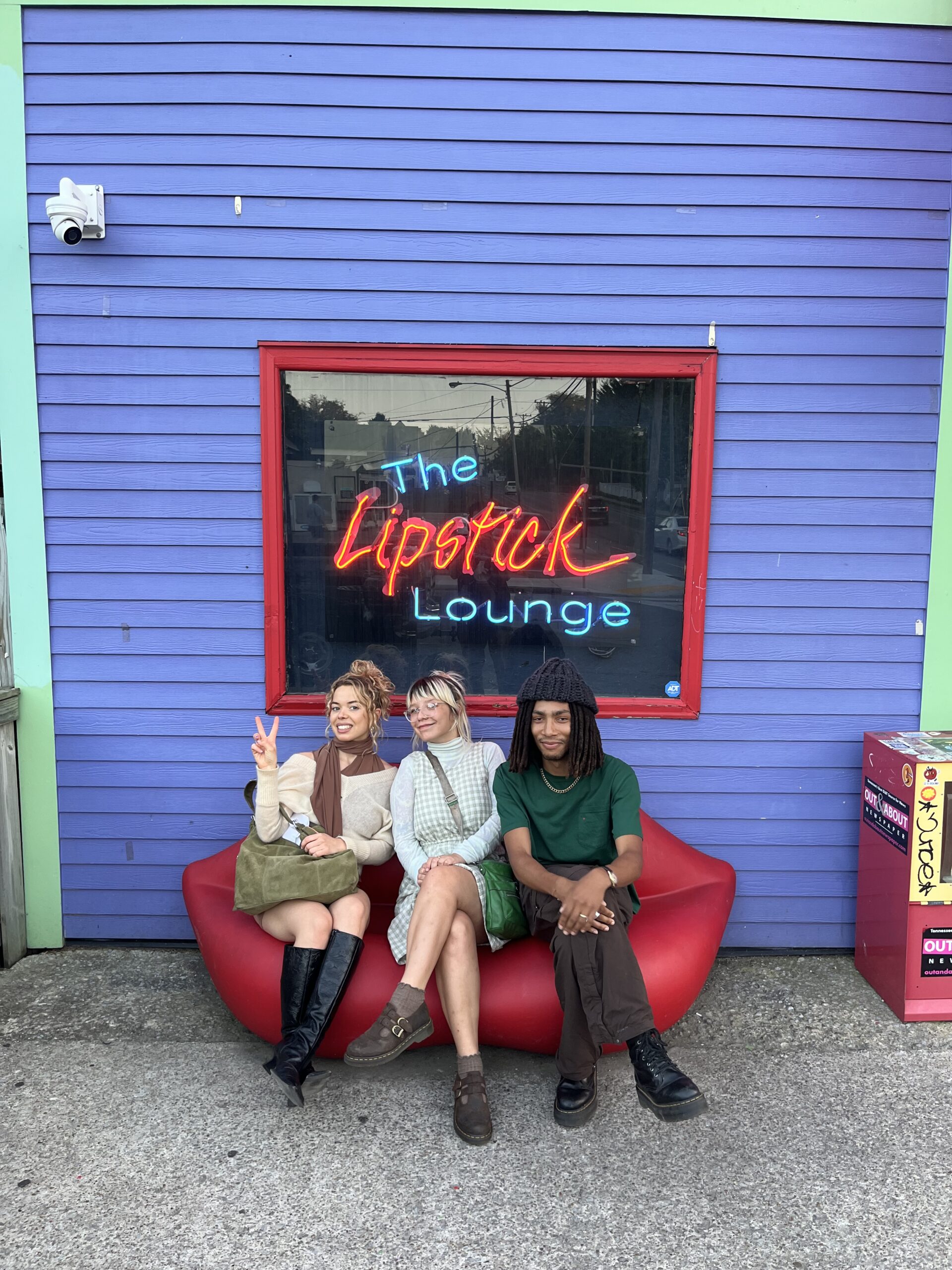
Photo courtesy of Lutalo Jones and the band.
JONES: Well, I’ll definitely check that out. I know it’s hard because we have so much outsourced manufacturing in the States, and it’s probably the same thing in the UK. I don’t necessarily have problems with that, but if we have a whole generation of people who are going to continue to pick up different trades, I think that’ll become popularized again. There’s a lot of identity that gets tied into the work that people do and the things that they create. I don’t want our art and our homes and our surroundings to suffer because we’re focused on getting TikTok famous. If people want to keep doing that, that’s fine, but there has to be a balance to it, right?
YANYA: Because you know that TikTok is going to disappear eventually.
JONES: Eventually.
YANYA: Everything disappears. That’s what a lot of people are saying at the moment, that they’ve given up all their data and all their fan base to these platforms and then they’re nothing without the platforms. How can you sell a tour without a platform? How can you tell people about your record without a platform?
JONES: Right. Have you found ways to combat that for yourself? Do you have a mailing list or something like that?
YANYA: I have a mailing list. I don’t know how big it is though.
JONES: Yeah, I don’t know either. It’s weird because this question or this issue has been now starting to be more widely addressed, but it’s so interesting because most of these social media apps do have the attention lottery right now. It’s really hard to be like, “Hey, I have this thing over here that completely separates you from the thing that you always are on.” That’s a complicated one for sure.
YANYA: Yeah. Crazy.

